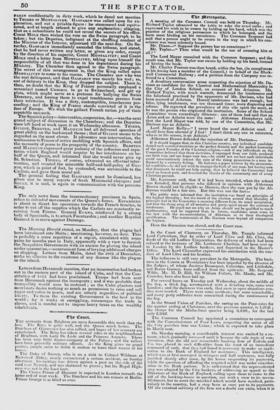Ube Petri:wino.
A meeting of the Common Council was held on Thursday. Mr. Richard•Taylor advanced to the table to take the usual oaths ; and expressed his wish to be sworn by holding up his hand, which was the practice of the religious persuasion to which he belonged, and the form most binding on his conscience. The Common Sergeant had said that a person ought to be sworn in the way in which his con- science was most solemnly bound. Mr. Dixon—" Suppose the person has no conscience ?" Mr. Taylor--" Then what would be the use of swearing him at all ?"
The Lord Mayor consulted with the Common Sergeant ; and the result was, that Mr. Taylor was sworn by holding up his hand, instead of kissing the book.
Mr. Charles Pearson was then heard, within the bar, (in compliment to his having been a member of the Council,) in behalf of the Black- wall Commercial Railway ; and a petition from the Company was re- ferred to a Committee.
A desultory conversation arose respecting the rejection of Mr. Da- vison as candidate for the Classical and Mathematical Mastership in the City of London School, on account of his Arianism. Mr. Richard Taylor, with much warmth, denounced the intolerance and the falsehood practised by the opponents of Mr. Davison, who had been accused of Atheism. Honest intolerance was bad enough; but false, lying intolerance, was ten thousand times more disgusting and odious. He regretted the prevalence of this vile spirit the more, as he was the person who originated the institution. Some of the School Committee were exceedingly illiterate : one of them had said that an Arian and an Atheist were the same ! Alderman Humpherys said, that the Lord Mayor was told, by one of the Committee, that Mr. Davison was an Atheist.
Lord Mayor Kelly-4, I never heard the word Atheist used. I shwa have been alarmed if I Ead ! I don't think any one in existence, who is in his senses, is an Atheist."
Alderman Brown defended the rejection of Mr. Davison—.
If it should happen that, in this Christian country, any individual candidate denied such e.sential doctrines as the perfect divinity mid the perfect humanity of the great Founder of the Christian religion,—and if any individuals on the Committee believed that those doctrines, if expunged from our faith, rendered our faith vain and our hopes vain too,—he could not see how such individuals could conscientiously intrust the care of the rising generation to a man in- fluenced by a contrary feeling. He had seen a paper written by the unsuccess- ful candidate—he did not wish to impugn the faith of any man, but having seen that document, he could not help saying, that be believed the Committee had acted an honest part, and deserved the thanks of the community and of every Christian present.
Mr. Lawrence said, that if it had been intended, when the school was founded, that persons who differed in opinion with Alderman Brown should not be eligible as Musters, then the case put by the Al- derman would be a fair one. But this was not the fact— The public were inflamed that the institution was based on principles of the highest liberality ; but the result of the election proved that liberality of principle had in the Committee a meaning different from its usual acceptation, and that the doing away of all sectarian and party-spirit meant the extreme of intolerance. He could nut see why an Arian should not be qualified to teach mathematics; and he supposed that, in future, caudidates must come to the test with the recommendation of Aldermen as to their theological qualification. The testimonials of Mt. Davison were beyond all comparison the highest.
Ilere the discussion was closed, and the Court rose.


























 Previous page
Previous page